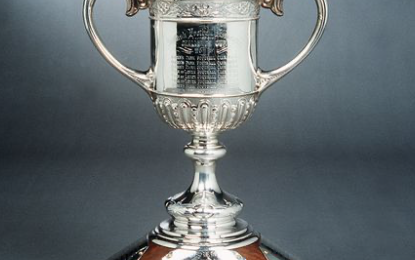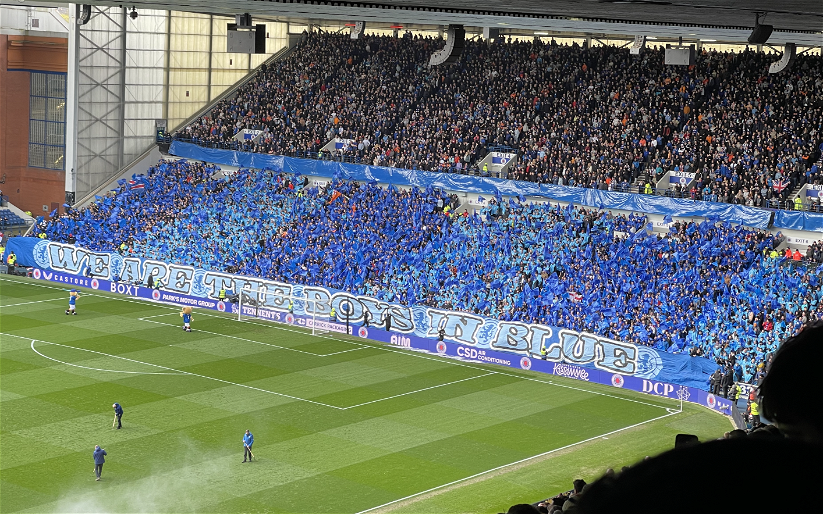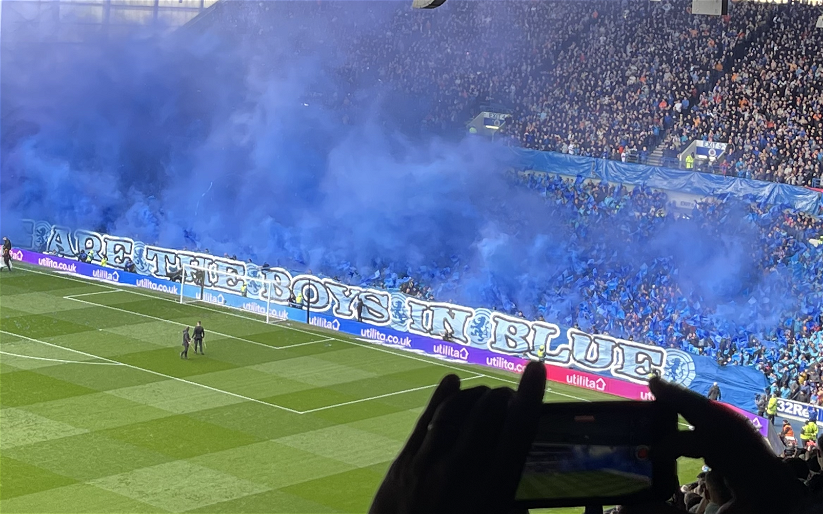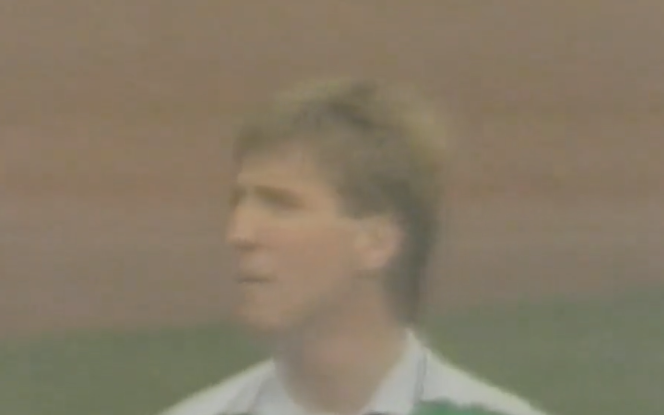By Alistair Aird
Since our birth 150 years ago, Rangers have made it to the semi-finals of the Scottish Cup on 66 occasions. We first made it the last four in season 1876/77, yet we didn’t have to play a semi-final tie as, remarkably, we received a bye!
This was the fourth time the Scottish Cup had been contested, and a total of 81 teams entered. The first two rounds were regionalised, with Rangers drawn against teams under the umbrella of ‘Glasgow and Suburbs’. By the time the tournament went ‘national’, there were 41 teams left, Rangers receiving a bye in the Third Round when the draw was made.
And after six teams reached what was equivalent to the quarter-final stages, Rangers again got lucky. The Light Blues, Ayr Thistle (after a replay) and Vale of Leven were the three winners, and when the semi-final draw was made, Vale of Leven drew Ayr leaving Rangers again with a bye. For the record, Vale of Leven annihilated Ayr 9-0 and then beat us in the Final at Hamilton Crescent. After two drawn matches, Rangers lost the second replay 3-2.
Rangers received a semi-final bye again two years later before finally taking to the field in a Scottish Cup semi on 19 January 1884. The match in Alexandria was one-sided, though, Vale of Leven winning by three goals to nil.
Of the semi-finals that haven’t resulted in a bye, 16 have required a replay and two of those, the tussles with Third Lanark in season 1897/98 and Albion Rovers in season 1919/20, needed a further replay to settle matters. Rangers won the first of them 2-0 courtesy of goals from John McPherson and Neilly Gibson – Gibson’s goal came from the penalty spot – but surprisingly succumbed to Albion Rovers at Celtic Park in the second one.
A late penalty from Rovers in the first match forced the first replay – Dr James Paterson scoring for Rangers – and after another stalemate four days later, Rovers won the third encounter. The result was a shock since Rangers had won the Division One title while Rovers finished rock bottom and were relegated. The two league meetings between the two teams that season had ended 3-0 and 4-0 in the favour of Rangers too.
Our overall semi-final record (excluding the two byes) is:
First Matches
|
Played |
Won |
Drawn |
Lost |
For |
Against |
|
64 |
38 |
16 |
10 |
126 |
73 |
Replays
|
Played |
Won |
Drawn |
Lost |
For |
Against |
|
16 |
11 |
2 |
3 |
31 |
16 |
Second Replays
|
Played |
Won |
Drawn |
Lost |
For |
Against |
|
2 |
1 |
0 |
1 |
2 |
2 |
Opponents
Rangers have faced 24 different teams in the last four of the Scottish Cup. It should come as no surprise that Sunday’s opponents, Celtic, are the side we have faced most often:
|
Opponent |
Number of Times Faced |
|
Aberdeen |
4 |
|
Albion Rovers |
2 |
|
Ayr United |
2 |
|
Celtic |
11 |
|
Clyde |
1 |
|
Dundee United |
3 |
|
Dunfermline Athletic |
1 |
|
East Fife |
1 |
|
Falkirk |
1 |
|
Forfar Athletic |
1 |
|
Hamilton Accies |
1 |
|
Hearts |
5 |
|
Hibernian |
6 |
|
Kilmarnock |
2 |
|
Morton |
3 |
|
Motherwell |
3 |
|
Partick Thistle |
3 |
|
Queen’s Park |
1 |
|
Queen of the South |
1 |
|
St Johnstone |
4 |
|
St Mirren |
5 |
|
Stenhousemuir |
1 |
|
Third Lanark |
1 |
|
Vale of Leven |
1 |
Scottish Cup Semi Final Record Against Celtic
Our overall record against Celtic in the 11 semi-final ties played is:
First Matches
|
Played |
Won |
Drawn |
Lost |
For |
Against |
|
11 |
5 |
2 |
4 |
15 |
23 |
Replays
|
Played |
Won |
Drawn |
Lost |
For |
Against |
|
2 |
1 |
0 |
1 |
4 |
5 |
The first Old Firm semi-final took place on 6 February 1892 at Parkhead. Reports suggest the weather was wet, windy and wild, and Celtic were 4-0 up at half-time. They added another early in the second half, and despite a late Rangers rally that yielded goals from John Law, James Henderson and Neil Kerr, Celtic made it through. They beat Queen’s Park 5-1 in a replay after the first match was declared void for ‘crowd encroachment’.
Rangers were beaten again when the rivals clashed in season 1899/00 – a late McPherson goal at Ibrox forced a replay which Celtic won 4-0 – but earned their Old Firm first Scottish Cup semi final win five years later in controversial circumstances. Goals from Finlay Speedie and Jacky Robertson had Rangers 2-0 ahead at Parkhead with 12 minutes to go when Celtic’s Jimmy Quinn was ordered off. The Celtic fans took umbrage at the decision and invaded the field of play forcing the referee to abandon the match. In the days that followed, Celtic conceded the tie. Rangers lost out to Third Lanark after a replay in the Final.
Two decades passed before we met again in the last four. Rangers were the dominant team ahead of the tie which took place on 21 March 1925 at Hampden. We had won the previous two league titles and were on course for three-in-a-row. The league meetings that season had ended with Rangers the victors, an Alan Morton goal the difference at Parkhead in October, while a Geordie Henderson double and goals from Andy Cunningham and Billy McCandless had secured a comfortable 4-1 win on New Year’s Day at Ibrox.
Rangers were therefore clear favourites for the semi-final. The match was watched by Scotland’s first-ever six-figure crowd for a club match, with 101,714 patrons clicking through the turnstiles. And they observed the opening of the match panning out as expected. Rangers monopolised the ball and 25 minutes elapsed before Willie Robb in the Rangers goal had a shot to deal with. However, the match report in the Glasgow Herald bemoaned the fact that Rangers’ attacking play lacked ‘subtlety and originality’ and that was duly punished when Jimmy McGrory was left unmarked to break the deadlock after 30 minutes.
Celtic rode their luck after that – Davie Meiklejohn struck the underside of the crossbar with a ‘fast shot’ – but remarkably Rangers folded after the interval and Celtic capitalised on a number of errors to score four second half goals and run out emphatic winners. Reflecting on the encounter, the reporter in the Glasgow Herald intimated that Rangers were ‘temperamentally unsuited for an unnerved by what is termed Cup-tie football, and the repeated failures in the Scottish Cup competition of practically the present eleven have evidently affected them’. Rangers had last won the trophy in 1903, and it would be another three years before the hoodoo was busted.
The giants clashed at the penultimate stage of the competition once again in season 1959/60. A replay was required to separate them too. On Saturday, 2 April the wind swirled around Hampden and Cyril Horne, writing in the Glasgow Herald, lamented the fact that neither team kept the ball on the ground for too long. He penned, ‘there was a great deal more lofted kicking which caused an irritating succession of shies.’ It will come as no surprise then that both goals scored were headers, Stevie Chalmers nodding Celtic ahead after 25 minutes before Jimmy Millar thumped in a 15-yard header from a Davie Wilson cross after 69 minutes.
Horne opined that there was ‘mediocrity’ in the play in the replay too, but that didn’t matter to the Rangers fans. Davie Wilson gave them the lead after 28 minutes, and despite parity being restored by Neil Mochan, second half goals from Millar (2) and Wilson saw them through to the Final.
Thirty-two years passed before Rangers met Celtic in the Scottish Cup semis again, and this occasion would prove to be a seminal moment in the managerial career of Walter Smith. Walter was almost two-thirds of the way through his first full season as the Rangers manager, but his side were still gelling. They were neck-and-neck with Hearts in the title race but had lost to Hibernian in the League Cup and exited the European Cup in the opening round, losing to Sparta Prague on ‘away’ goals. This, however, would be the night that his team was born. It would provide the platform for the silver-laden success that followed.
The night started in the worst possible fashion for Rangers. In the midst of a torrential downpour and wild winds, David Robertson robustly halted a forward run by Joe Miller after six minutes. It was a poor challenge that merited a yellow card, but there were cries of astonishment when referee Andrew Waddell brandished a red card.
But the 10 men dug in and secured a famous victory. On the stroke of half time, Stuart McCall battled to win the ball in midfield, and his slide-rule pass was perfect for Ally McCoist. Ally didn’t have to break stride as he rapped a right foot shot beyond the Celtic goalkeeper. The deadlock was broken, and after the interval, Rangers weathered the Celtic storm. Although the frame of the goal shuddered numerous times, Walter’s warriors held firm. A few weeks later, Airdrie were beaten in the Final, handing Rangers the Scottish Cup for the first time since 1981.
McCoist was among the goals in the next two semi-final encounters with Celtic too. He opened the scoring in season 1995/96 with a typical predatory finish and did likewise in season 1997/98 with a diving header from a superb Jorg Albertz cross. The latter goal was McCoist’s 27th and last goal against Celtic. In case he’s reading this, I should clarify that that was his 27th goal for Rangers against Celtic. He also netted twice against them in the fledgling years of his career with St Johnstone.
Both of those matches finished 2-1 in the favour of Rangers. Brian Laudrup got the second goal in 1996, running on to a lofted pass from Gordon Durie and lobbing the ball over Gordon Marshall. That took Rangers through to meet Hearts, and Durie and Laudrup ran the show. ‘Jukey’ scored a hat-trick, with all the goals created by Laudrup. The Great Dane netted the other two goals in a 5-1 win.
The second goal in 1998 came from the left boot of Jorg Albertz. ‘Der Hammer’ embarked on a slaloming run through the Celtic defence before rocketing a shot into the roof of the net. He scored a similar goal in a 2-0 Old Firm league win a week later too. Hearts were the opponents in the Final that year, but on this occasion the Edinburgh side won 2-1.
By the time the teams met again, Rangers had gone through financial turmoil, been demoted to the lower leagues and were on what would be the last leg of the journey back to the top flight. Under Mark Warburton, the Championship title was in the bag, but not many expected them to match a Celtic side that were chasing a domestic Treble. But on another memorable Old Firm afternoon, a Kenny Miller goal opened the scoring, and a wonderful long-range effort from Barrie McKay made it 2-1 before Celtic forced extra-time. There were no further goals in the extra half hour, so ‘kicks from the penalty mark’ were required.
Andy Halliday was first up for Rangers, and he scored, but James Tavernier, in his debut season with Rangers, ballooned the ball over the bar with our second kick. It was a poor effort, and back then you wouldn’t have foreseen the excellent penalty kick record he has now!
It was advantage Celtic but misses from McGregor and Brown coupled with a miss from Nicky Clark restored parity. Wallace, Zelalem and Law then netted for Rangers which heaped the pressure on Tom Rogic to keep Celtic alive. He couldn’t, his effort having more chance on doing a lunar orbit than hitting the back of the net. Unfortunately, Rangers lost out to Hibernian in the Final.
As for the last two encounters with Celtic at the semi-final stage in season 2016/17 and season 2017/18, the least said about them the better!
There will be no replay on Sunday, with the tie being played to a finish. If Rangers are to chalk up semi-final victory number six over Celtic, then they will need to reproduce the same level of intensity and application they did on Thursday against SC Braga. The opening minutes of the recent league match at Ibrox suggested that that would reap rewards.
But the expenditure of energy on Thursday places huge emphasis on recovery. Celtic have had the luxury of a full eight days to prepare for this so they should be fresher. On the other hand, the adrenaline that coursed through everyone’s veins when the final whistle went against Braga has shown no signs of dissipating so that may work in Rangers’ favour.
I would be tempted to name the same starting XI if they are all fit and have recovered their energy levels. After this one we have a full week before we play again against Motherwell in the league. With options to call upon from the bench, why not ask our Europa League heroes for one last push before they get a well-earned break?
The big games just keep on rolling in for Rangers. We stand on the verge of one of the most monumental seasons in our 150-year history and adding the semi-final scalp of Celtic would be an undoubted highlight as the quest for honours at home and abroad continues.




